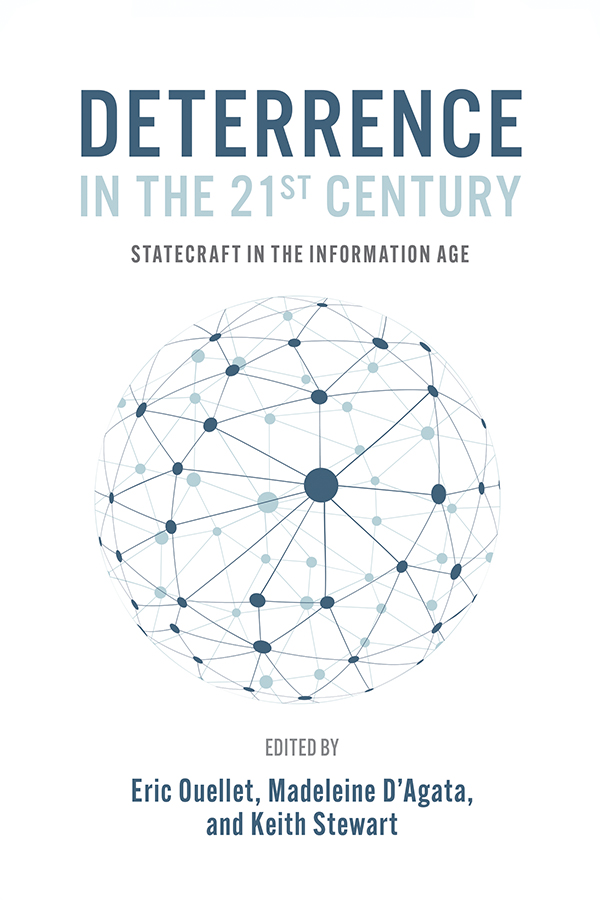
Deterrence in the 21st Century: Statecraft in the Information Age
Edited by Eric Ouellet, Madeleine D’Agata, and Keith Stewart
$98.99 HC / $58.99 PB (S)
392 pages, 1 illustration
6 x 9 inches
Hardback: 978-1-77385-480-9
Paperback: 978-1-77385-403-8
Epub: 978-1-77385-406-9
Library PDF: 978-1-77385-405-2
January 2024
Leading experts in defence and security studies advancing our understanding of how to deter disinformation by pre-empting our adversaries, a most pressing and difficult security challenge of the 21st Century.
The information age has opened a new front of adversarial statecraft. The past decades have seen the rise and refinement of conflict enacted in the world of information, with tactics including seeding disinformation, the theft of sensitive data, confusing or obscuring public opinion to forward specific goals, and beyond. Deterrence in the 21st Century asks how, and if it is indeed possible, to deter an enemy in the realm of information warfare.
Setting the stage with an overview of key concepts of deterrence in the information age, the book presents new conceptual approaches and their possible applications. Bringing together some of the most respected analysts working today, Deterrence in the 21st Century looks beyond the technical aspects of the use of information and disinformation as adversarial statecraft to seek new avenues to deter the undermining of institutions and societies.
Treating deterrence as a concept, a policy, a social challenge, and a series of practical solutions, Deterrence in the 21st Century presents theoretical approaches, conceptual analysis, empirical research, and content analysis. This is a thorough, thoughtful, and expert analysis of one of the most difficult and essential security challenges of our time.
With contributions by: Christopher Ankersen, Yair Ansbacher, Oshri Bar-Gill, Stephen J. Cimbala, Maddie D’Agata, Molly Ellenberg, Leandre R. Fabrigar, Rachel Lea Heide, Nicole J. Jackson, Pierre Jolicoeur, Christian Leuprecht, Adam Lowther, Sarah Jane Meharg, Eric Ouellet, Ronald D. Porter, Anthony Seaboyer, Ron Schleifer, Miniqian Shen, Anne Speckhard, Keith Stewart, Joseph Szeman, and Alex Wilner
Eric Ouellet is a full professor at the Royal Military College of Canada in Defence Studies, teaching to mid and senior level officers at the Canadian Forces College. He is founder and director of the Centre for Institutional Analysis of Armed Forces, and has been involved in numerous international collaborative research projects on military matters.
Madeleine D’Agata received her PhD in psychology in 2017. From 2017 to 2022, she was a Defence Scientist at Defence Research and Development Canada. Dr. D’Agata has published over 60 reports. In 2022 she deployed to Chief, Professional Conduct and Culture and is a Senior Policy Advisor.
Keith Stewart works at Defence Research and Development Canada’s Toronto Research Centre. In a 30-year career, which has included periods in private industry and government service, he has focused on human-centric research issues, including influence operations, human elements of military command, and human error in high hazard environments.
Foreward
Vice-Admiral B. Auchterlonie, Commander Canadian Joint Operations Command
Preface
Peter Kwantes, Chief Scientist, Defence and Research and Development Canada, Toronto Research Centre
Introduction
Eric Ouellet, Royal Military College of Canada
Section I. Deterrence as an Evolving Concept
Deterrence Is Always about Information: A New Framework for Understanding
Christopher Ankersen, New York University
Nuclear Crisis Management for the Information Age
Stephen J. Cimbala, Penn State Brandywine, and Adam B. Lowther, Nation Strategic Research Institute
Deterrence by De-legitimization in the Information Environment: Concept, Theory, and Practice
Alex Wilner, Carleton University
Section II. Wider Strategic Contexts and Experiences
Understanding Russia’s Approaches to Information Warfare
Rachel Lea Heide, DRDC Centre for Operational Research and Analysis
The Evolution of China’s Information Exploitation of COVID-19
Anthony B. Seaboyer and Pierre Jolicoeur, Royal Military College of Canada
Deterrence in the Gaza Conflict: Hamas Case Study Analysis
Ron Schleifer and Yair Ansbacher, Ariel University of Samaria
Resilience as a Framework for Deterrence in the Information Age: Lessons Learned from Israel about Information and Influence Operations
Oshri Bar-Gil, IDF Applied Behavioral Science Institute
Section III. Canada’s Context
Deterrence and Strategic Disinformation: An Overview of Canada’s Responses
Nicole J. Jackson, Simon Fraser University
Exit, Voice, or Loyalty? Functional Engagement as Cyber Strategy for Middle Power Statecraft
Joseph Szeman, Queen’s University, and Christian Leuprecht, Royal Military College of Canada
Section IV. Emerging Tools and Approaches
Digital Tribalism and Ontological Insecurity: Manipulating Identities in the Information Environment
Sarah Jane Meharg, Canadian Forces College
Deterrence for Online Radicalization and Recruitment in the Twenty-First Century
Anne Speckhard and Molly Ellenberg, International Center for the Study of Violent Extremism
Assessing Influence in Target Audiences that Won’t Say or Don’t Know How Much They Have Been Influenced
Ronald D. Porter, Saint Mary’s University—Calgary, Minqian Shen, Queen’s University, Leandre R. Fabrigar, Queen’s University, and Anthony Seaboyer, Royal Military College of Canada
Conclusion
Keith Stewart and Madeleine D’Agata, Defence and Research and Development Canada, Toronto Research Centre
Afterword
Lieutenant-General Jennie Carrigan, Chief of Professional Conduct and Culture
Postface
Eric Ouellet
List of Abbreviations
About the Authors
Index
A well-documented and thought-provoking compilation of Canadian perspectives on the interaction of modern-day deterrence postures affected by disinformation threats.
—Parameters Bookshelf
Deterrence Is Always About Information: A New Framework for Understanding
Deterrence by De-legitimization in the Information Environment: Concept, Theory, and Practice
The Evolution of China's Information Exploitation of COVID-19
Deterrence and Strategic Disinformation: An Overview of Canada's Responses
Exit, Voice, or Loyalty? Functional Engagement as Cyber Strategy for Middle Power Statecraft
Digital Tribalism and Ontological Insecurity: Manipulating Identities in the Information Environment
Deterrence for Online Radicalization and Recruitment in the Twenty-First Century